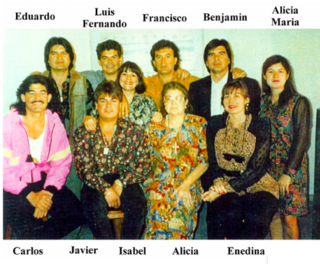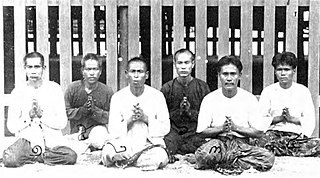Related Research Articles

Money laundering is the process of concealing the origin of money, often obtained from illicit activities such as drug trafficking, corruption, embezzlement or gambling, by converting it into a legitimate source. It is a crime in many jurisdictions with varying definitions. It is usually a key operation of organized crime.

Organized crime is a category of transnational, national, or local groupings of highly centralized enterprises run by criminals to engage in illegal activity, most commonly for profit. While organized crime is generally thought of as a form of illegal business, some criminal organizations, such as terrorist groups, rebel forces, and separatists, are politically motivated. Sometimes criminal organizations force people to do business with them, such as when a gang extorts money from shopkeepers for "protection". Street gangs may often be deemed organized crime groups or, under stricter definitions of organized crime, may become disciplined enough to be considered organized. A criminal organization can also be referred to as a gang, mafia, mob, ring, or syndicate; the network, subculture, and community of criminals involved in organized crime may be referred to as the underworld or gangland. Sociologists sometimes specifically distinguish a "mafia" as a type of organized crime group that specializes in the supply of extra-legal protection and quasi-law enforcement. Academic studies of the original "Mafia", the Sicilian Mafia, which predates the other groups, generated an economic study of organized crime groups and exerted great influence on studies of the Russian mafia, the Chinese Triads, the Hong Kong Triads, and the Japanese Yakuza.
Free economic zones (FEZ), free economic territories (FETs) or free zones (FZ) are a class of special economic zone (SEZ) designated by the trade and commerce administrations of various countries. The term is used to designate areas in which companies are taxed very lightly or not at all to encourage economic activity. The taxation rules and duties are determined by each country. The World Trade Organization (WTO) Agreement on Subsidies and Countervailing Measures (SCM) has content on the conditions and benefits of free zones.
Sun Yee On, or the New Righteousness and Peace Commercial and Industrial Guild, is one of the leading triads in Hong Kong and China. It has more than 25,000 members worldwide. It is also believed to be active in the UK, the United States, France and Belgium.
The Financial Action Task Force (FATF), also known by its French name, Groupe d'action financière (GAFI), is an intergovernmental organisation founded in 1989 on the initiative of the G7 to develop policies to combat money laundering. In 2001, its mandate was expanded to include terrorism financing.

The Proceeds of Crime Act 2002 (c.29) (POCA) is an Act of the Parliament of the United Kingdom which provides for the confiscation or civil recovery of the proceeds from crime and contains the principal money laundering legislation in the UK.
Organised crime in India refers to organised crime elements originating in India and active in many parts of the world. The purpose of organised crime in India, as elsewhere in the world, is monetary gain. Its virulent form in modern times is due to several socio-economic and political factors and advances in science and technology. There is no firm data to indicate the number of organised criminal gangs operating in the country, their membership, their modus operandi and the areas of their operations. Their structure and leadership patterns may not strictly fall in line with the classical Italian mafia.
Australian Transaction Reports and Analysis Centre (AUSTRAC) is an Australian government financial intelligence agency responsible for monitoring financial transactions to identify money laundering, organised crime, tax evasion, welfare fraud and terrorism financing. AUSTRAC was established in 1989 under the Financial Transaction Reports Act 1988. It implements in Australia the recommendations of the Financial Action Task Force on Money Laundering (FATF), which Australia joined in 1990.
Terrorism financing is the provision of funds or providing financial support to individual terrorists or non-state actors.
The Egmont Group of Financial Intelligence Units is an international organization that facilitates cooperation and intelligence sharing between national financial intelligence units (FIUs) to investigate and prevent money laundering and terrorist financing. National FIUs collect information on suspicious or unusual financial activity and are responsible for processing and analyzing the information received. FIUs are normally not law enforcement agencies themselves, findings are shared with appropriate law enforcement or prosecution bodies if sufficient evidence of unlawful activity is found. The Egmont Group is headquartered in Toronto, Ontario, Canada.
Albanian mafia or Albanian organized crime are the general terms used for criminal organizations based in Albania or composed of ethnic Albanians. Albanian organized crime is active in Europe, North America, South America, and various other parts of the world including the Middle East and Asia. The Albanian Mafia participates in a diverse range of criminal enterprises including trafficking in drugs, arms, and humans. They are said to control a large part of the billion dollar wholesale cocaine market in Europe and appear to be the primary distributors of cocaine in various European drug hubs including London. Albanian organized crime is characterized by diversified criminal enterprises which, in their complexity, demonstrate a very high criminal capacity. In Albania, there are over 15 mafia families that control organized crime.
Financial intelligence (FININT) is the gathering of information about the financial affairs of entities of interest, to understand their nature and capabilities, and predict their intentions. Generally the term applies in the context of law enforcement and related activities. One of the main purposes of financial intelligence is to identify financial transactions that may involve tax evasion, money laundering or some other criminal activity. FININT may also be involved in identifying financing of criminal and terrorist organisations. Financial intelligence can be broken down into two main areas, collection and analysis. Collection is normally done by a government agency, known as a financial intelligence organisation or Financial Intelligence Unit (FIU). The agency will collect raw transactional information and Suspicious activity reports (SAR) usually provided by banks and other entities as part of regulatory requirements. Data may be shared with other countries through intergovernmental networks. Analysis, may consist of scrutinizing a large volume of transactional data using data mining or data-matching techniques to identify persons potentially engaged in a particular activity. SARs can also be scrutinized and linked with other data to try to identify specific activity.
Organized crime in Nigeria includes activities by fraudsters, bandits in Northern Nigeria, drug traffickers and racketeers, which have spread across Western Africa. Nigerian criminal gangs rose to prominence in the 1980s, owing much to the globalization of the world's economies and the high level of lawlessness and corruption in the country.
Organised crime in Australia refers to the activities of various groups of crime families, organised crime syndicates or underworld activities including drug trafficking, contract killing, racketeering and other crimes in Australia.

Carlos Alberto Arellano Félix is a Mexican medical doctor who is known for his illegal involvement in money laundering for the Tijuana Cartel. Carlos was born on the 20th of August in the year 1955 in the city of Culiacán, Sinaloa. Historian Paul Eiss states that Culiacán is the origin of modern drug trafficking and the home of Mexico's most powerful drug cartel. Carlos is currently working as a licensed surgeon. He finished his surgical training at the Universidad Autónoma de Guadalajara The Tijuana Cartel is an organisation that is notorious for being one of the most well-known drug trafficking groups in Mexico to smuggle goods into the United States. Carlos’ family is made up of seven brothers and four sisters who inherited the Arellano Felix Organisation from their godfather, Miguel Ángel Félix. Despite Carlos’ involvement in money laundering for the Tijuana Cartel, he is one of two brothers who remains free and is not wanted by the United States law enforcement.
Namibia is located in sub-Saharan Africa, a region that has some of the highest crime rates in the world. Contributing factors are for instance poverty, a low level of development, and huge social and economic disadvantages. For example, according to government statistics, the unemployment rate reached 28.1% in 2014; in 2008, it was 51.2%.

A triad is a Chinese transnational organized crime syndicate based in Greater China and has outposts in various countries with significant overseas Chinese populations.
British firms are organised crime groups originating in the United Kingdom.
The Greek mafia is the colloquial term used to refer to various organized crime elements originating from Greece. Indigenous organized criminal groups are well-entrenched in the largest Greek urban centers, particularly in Athens.

The Organised Crime Act 2015 is a statute of the Parliament of Singapore that empowers the law enforcement authorities to detect, investigate, prevent and disrupt organised criminal activities, and to deprive persons involved in such activities of the benefits of their crime, as well as to make consequential and related amendments to certain other Acts. The law is designed specifically to grant the Government of Singapore more empowerment in fighting crime especially against masterminds who instruct and intimate others into criminal acts.
References
- 1 2 Malan, Faan; Smit, Ben (2001). Ethics and leadership in business and politics. Juta. p. 260. ISBN 9780702151699.
- 1 2 Cox, Dennis (2014). Handbook of Anti-Money Laundering. Wiley. p. 625. ISBN 9780470065747.
- ↑ Burchell, Jonathan (2004). "Criminal Law". In Van der Merwe, C. G.; Du Plessis, J. E. (eds.). Introduction to the Law of South Africa. Kluwer Law International. p. 490. ISBN 9789041122827.